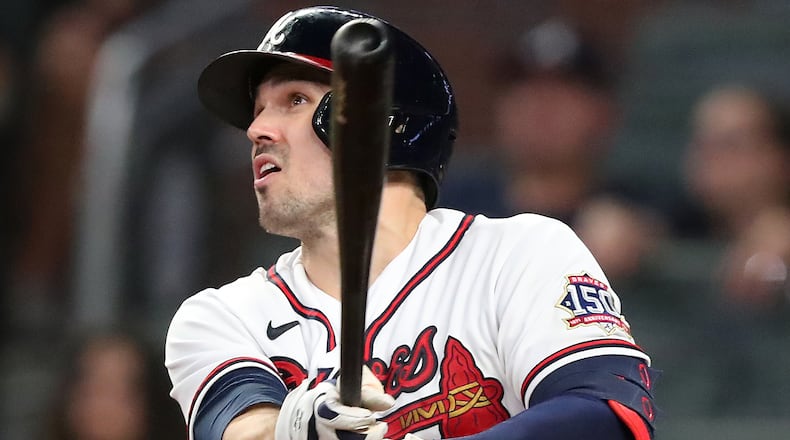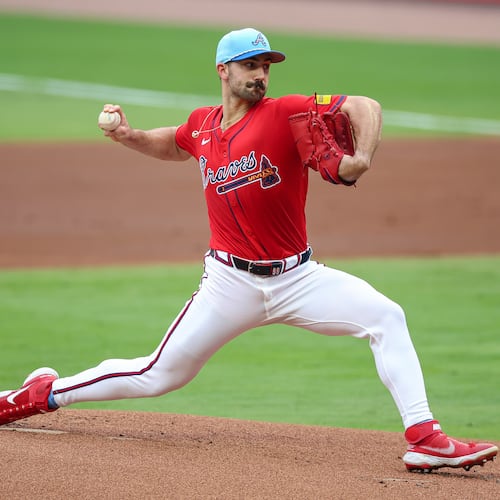Those watching Adam Duvall and his Braves Just Can’t Live Without Me Comeback Tour don’t see it. Who could know as the home runs and RBIs stack up about all the days when he just doesn’t feel exactly right? Those days when he’s riding the blood-sugar elevator and can’t quite get to the floor he wants. Because Duvall will never show it.
Sure, the insulin pump that discreetly tags along in the back pocket of his baseball britches has been a godsend. He has the best medical and nutritional support available. Still, playing major league ball – more than that, standing as one of the most productive power hitters in the game – while dealing with Type 1 diabetes isn’t nearly as easy as Duvall makes it look.
Every other body out there on the field naturally is doing the work of regulating the glucose that fuels every play. The diabetic has lost that luxury, and needs help striking a tricky, elusive balance.
Nothing to do but live with the inevitable spikes and dips.
“When I go low (in blood sugar), I start to get jitters,” Duvall said.
“When I go high, I’ll be very tired and sluggish.”
And just how many days in a long season does Duvall figure that he’s just a little off, one way or another?
“I would say half of the days probably,” he estimated. You would never know it.
“You’re dealing with a disease every day. There is still a lot of manual work that goes into it,” he explained.
There are multiple levels of surprise and, frankly, wonderment, behind the National League’s current (as of Thursday) RBIs leader.
Credit: HYOSUB SHIN / AJC
Credit: HYOSUB SHIN / AJC
There’s the humbling route taken to get here. The Braves first traded for a one-time All Star in mid-2018, only to use Duvall sparingly and send him packing to Triple-A Gwinnett to start the next season after hitting only .132 with no homers in 53 at-bats. Did he big-time it and pout as a Striper? No, he quietly applied himself there and hit bombs from Memphis to Norfolk to Durham (32 of them in 101 games) until the Braves had no choice but to bring him back for the close of 2019 and the COVID-shortened 2020. There he provided much of the punch that had been missing (26 home runs, 52 RBI in 74 games total).
Only to be non-tendered by the Braves at the end of last season, opening the door to free agency and Duvall’s relocation to Miami and the Marlins. But when the Braves’ outfield was depleted by injury (Ronald Acuna) and domestic strife (Marcell Ozuna) and their lineup lost all that muscle, who, among a few others, did they turn back to? The Braves just might be coming around to the notion that Duvall is good for them – slowly – like he’s kale or flossing.
For the price of a young, unproven catcher, they got the 33-year-old back at the end of July and he has been nothing but a run-producer since.
As of Thursday, he’s been 49 days a Brave Part II. Of his 101 RBIs, 33 have been as a Brave, along with 13 of his 35 home runs. When the Braves reacquired him, the benefit went two ways – not only did they get back his bat, but now he also could no longer use it to kneecap them.
“He just torched us when he was with the Marlins,” Braves manager Brian Snitker said. “I was so happy when we could get him back and get him out of Miami and get him with us.” In a dozen games against the Braves this year, Duvall hit .368 with five homers and 17 RBIs.
Credit: AP
Credit: AP
But to truly appreciate Duvall’s wending journey, you need to take all of the resilience he has shown in the last three years and add to it the difficulties of playing a hard game at an elite level while managing diabetes.
His accepting, patient attitude about it all is reflected in his walk-up music at Truist Park: “Call me the Breeze.”
Duvall could be a little smug now if he chose to be, given how the Braves had to use a Mulligan to get him back after once demoting him and then non-tendering him. But he makes a wiser choice.
“God put me where I needed to be, and that was that. Was I excited to come back? Yeah, because this is a cool, special place for me,” he said.
Expanding on special, Duvall added, “It’s where I spent the last three and a half years. A lot of good memories. A lot of ups and downs. There have been some tough times, but when you get through those tough times and come back through, that’s what makes it special.
“That’s the journey, that’s what makes it special, the ups and downs, coming out on the other side of it. Life or sports or anything is not always going to be easy. I’m a true believer in how you deal with things, and I chose to not deal with it in a personal way. When they sent me down to Gwinnett was that where I wanted to be – absolutely not. But I felt I went down there and did what I needed to do to get back up, and I feel like I’ve made the most of it.”
So happy were the Braves to have him back that Snitker rushed him into the lineup the day of the trade, admitting later he probably overtaxed Duvall at the time. Otherwise, his diabetes is no issue when making out the lineup card. Currently playing in center, he has the durability and defensive chops to anchor the Braves outfield.
Duvall’s trademark isn’t hitting for average – a career .232 hitter he was at .228 on Thursday even in the midst of a career-best 12-game hitting streak. Among the leaders in hitting with runners in scoring position, his stock in trade is timely pop.
He claims to know nothing of that number and waved off an attempt by a writer to fill him in (it was, by the way .323 with RISP).
Instead, here’s his approach: “It’s not just runners in scoring position – if you can drive runners in from first or drive yourself in from home, you’re going to help yourself out in the RBI situation. It’s kind of a joke, but the mentality is that every time I hit, I’ve got somebody in scoring position – that’s myself. I have the ability to drive myself in. That’s the mentality when I go up there.”
You don’t see the small insulin pump that levels out the symptoms of the diabetes that was diagnosed relatively late, when he was 23, playing high Single-A ball. You don’t know of those weary nights when he gets into town to start a road series, when he just wants to fall into bed, but first his schedule demands he find a new spot to stick himself and move his pump site before he can sleep. You don’t need to know that.
But Duvall wants people to know that with the right approach, look what’s possible.
“I try to have a good attitude and good outlook on (his diabetes). I would never try to disguise it because I want kids to know that you can play a sport (with it). If you put the time and effort and commitment into handling it the way you should, I feel like you basically can do anything you want to do.”
Just as he told a youngster in Washington earlier this season, the one he met following the game after noticing the sign he waved at Duval proclaiming that he was a diabetic, too. There are 1.6 million people with Type 1 diabetes in the U.S. according to the American Diabetes Association. But precious few in baseball (injured St. Louis pitcher Jordan Hicks is one other).
Credit: AP
Credit: AP
Once, Duvall said, “I kinda lived and died by my at-bats or my performance.” Experience, marriage, fatherhood has lent him a healthier perspective. He sees himself as a polar opposite of who he was just 10 years ago.
So, when asked about where he sees himself next season – he and the Braves have a mutual option for 2022, although the team may well rework a deal – all he says, Zen-like, is, “Just be where your feet are.”
And when outlining the priorities for himself as a player, he doesn’t need you to know the challenges he faces, just the consistency he tries for in spite of them.
“For me, it’s important to come in here and be a good teammate because that’s never really looked at from a fans’ standpoint,” Duvall said. “It’s come in here, help your teammates get better, which in turn is going to 100% help you get better. And come out and win ballgames. How I help them win ballgames is driving runners in and playing good defense. That’s what I come to park each and every day trying to do.”
About the Author
Keep Reading
The Latest
Featured






